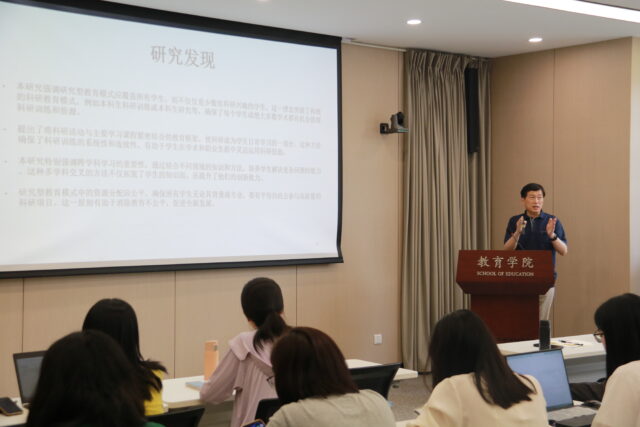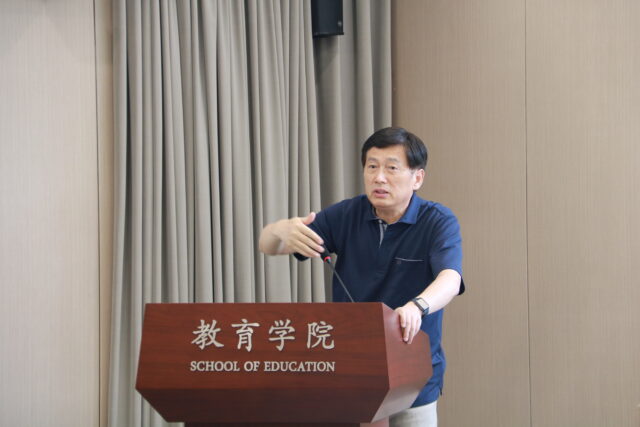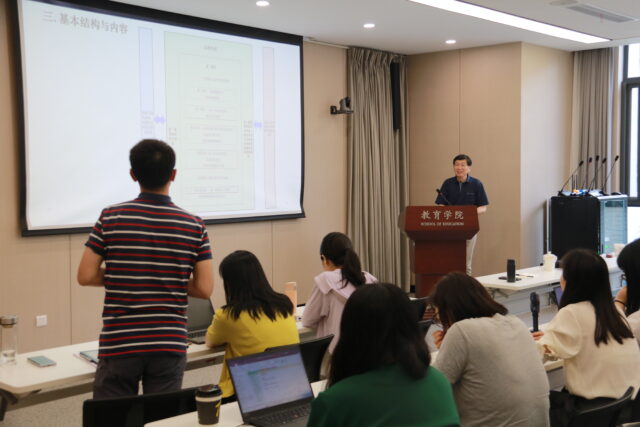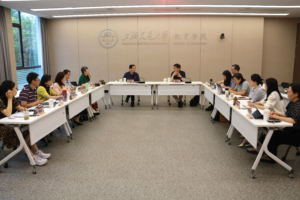Dates: July 11, 2024
Venue: Shanghai Jiao Tong University
Report contributed by: Professor Futao Huang
On July 11, 2024, Professor Huang Futao delivered a public lecture titled “Building a New Model for Innovative Talent Cultivation: Development and Challenges of Research-Based Undergraduate Education” at the invitation of the School of Education, Shanghai Jiao Tong University. In this lecture, Professor Huang examined and analyzed the reform processes in China and other related countries aiming to build world-class universities from an international comparative perspective, focusing on the development of a new bachelor’s level education model—research-based education.
Professor Huang first explained the background and significance of this research from three aspects: the practical needs for innovative talent, strong policy support from relevant countries, and the concrete practices at associated universities. He then organized the main curriculum models of Germany, the former Soviet Union, France, the United Kingdom, and the United States from the perspectives of time and country, briefly analyzing the limitations of the current bachelor’s education models. He emphasized the necessity of designing a more comprehensive and systematic research-based education model to supplement the deficiencies of existing major bachelor’s education models, providing more diverse and international learning opportunities, and cultivating students’ innovative abilities and research literacy.
Based on this, Professor Huang specifically introduced the fundamental characteristics and core contents of this new research-based education model from five aspects: educational philosophy and goals, theoretical sources, basic structure and content, implementation methods and means, and evaluation systems and methods.



Background of the School of Education, Shanghai Jiao Tong University
Shanghai Jiao Tong University established its Higher Education Research Office in 1985, founded the Institute of Higher Education in 2007, and established the School of Education in 2020. Currently, the School of Education has 38 full-time faculty members, many of whom are graduates of prestigious institutions such as Harvard University, Columbia University, and the Institute of Education at the University of London. The School aims to build a world-class education faculty, constructing a talent cultivation system that includes undergraduate minors, Master’s in Education, Master’s in Education Science, Doctor of Education, Doctor of Education Science, and international joint education for dual degrees. It is committed to training excellent teachers, education administrators, and education researchers for the future, exploring new models of teacher education in high-level comprehensive universities.
As of March 2024, the School of Education has 14 undergraduate minor students, 22 Ph.D. students, 34 academic master’s students, and 104 professional master’s students. The School has been committed to building its academic brand for many years, developing and publishing the world’s first multi-indicator global university ranking, the “Academic Ranking of World Universities (ARWU)” in 2003. It has also published the first Chinese and English books on world-class university research, compiled the first academic library on world-class universities, and hosted the first international academic conference on the theme of world-class universities. As a result, “world-class university research” has evolved from a research theme to a global hot research direction, with its influence continuously expanding both domestically and internationally.
The School of Education combines theoretical and practical research, providing research results in various forms such as expert recommendations, special reports, and individual consultations to support the educational reform and development decisions of government departments such as the Ministry of Education, the Ministry of Science and Technology, the Ministry of Finance, and the Shanghai Municipal Government. It also offers development strategy reports and policy reform suggestions to renowned research universities, including Shanghai Jiao Tong University. The School of Education has been selected for the “China Core Think Tank List.”

